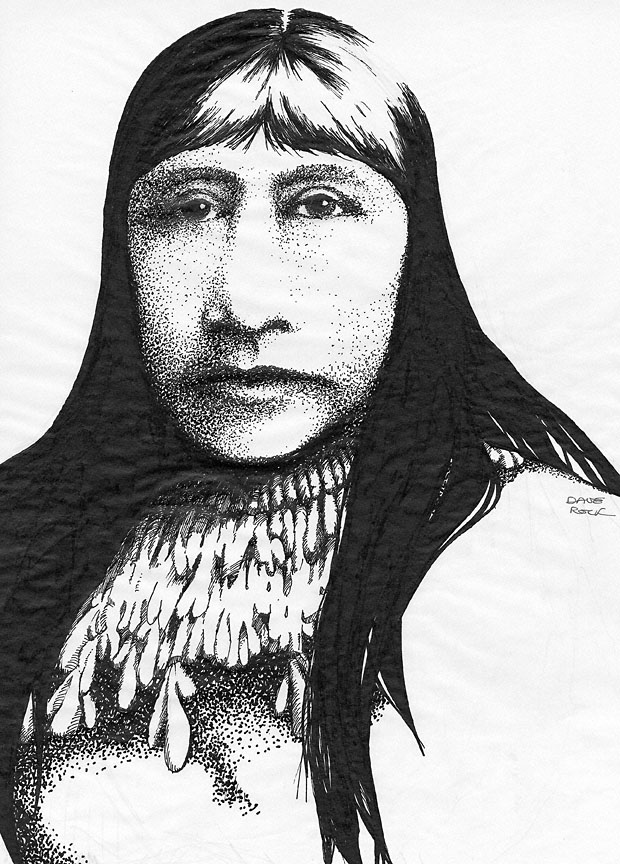The portrait above depicts Paiute diplomat, translator, and activist Sarah Winnemucca. It was drawn by Oregon artist Dave Rock in 1977.
Sarah Winnemucca was probably born around 1844 somewhere near northern Nevada’s Humboldt River Valley. Named Thocmetony (“shell flower”), she was the daughter of the prominent Northern Paiute leader Winnemucca. She spent much of her life in southeastern Oregon. Although Sarah Winnemucca’s story spans a much wider stage than only Malheur County, this remarkable individual’s diplomatic actions there during the 1860s and 1870s proved crucial to the survival of the high desert’s Paiute people and in lessening the loss of life of white settlers and soldiers. Having learned how to read and write while living with a white family in Nevada, Sarah Winnemucca became an interpreter for the Army and, later, for reservation agents, most of whom she considered to be corrupt or incompetent.
Sarah Winnemucca lived for some years at Fort Bidwell and spent much of her time at the Malheur Reservation. Unlike her fellow Paiutes, she had traveled widely throughout the settled-up West and realized the overwhelming power of the whites’ economy and population. During the Bannock War, at serious risk to her own life, she rode back and forth across Malheur County, negotiating and pleading the cause of peace between both Army units and Northern Paiute bands. Although she was largely successful in this endeavor, some Paiutes later castigated her as a “turn coat.” Rather, she served forcefully as a key intermediary between Native and white cultures. Much to the consternation of reservation agents, she subsequently started and ran the first school in the West where Native children could remain with their families, and where they were not forced to stop speaking their native language.
With the support of reformers in Boston and New York City, she traveled throughout the country, lecturing to friendly and hostile audiences alike on the corrupt agency system and the need for Native self-government and land rights. As documented by her biographer, Sarah Winnemucca’s Life Among the Piutes: Their Wrongs and Claims (1883), a description of her people’s culture and a plea for their future, is “the first [book] by an Indian woman, the first by any Indian west of the Rockies.”
Further Reading:
Sarah Winnemucca Hopkins. Life Among the Piutes: Their Wrongs and Claims. New York, N.Y., 1883.
Sally Zanjani. Sarah Winnemucca. Lincoln, Nebr., 2001.
Written by Jeff LaLande, Cain Allen, © Oregon Historical Society, 2005.
